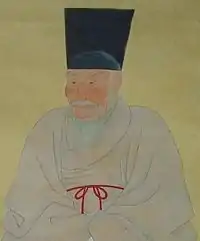Lee Seo-woo
Lee Seo-woo (* 1. März 1633 in Seoul; † 14. Oktober 1709) war ein koreanischer Philosoph, Dichter und Politiker in der Epoche der Joseon-Dynastie, als Korea unter Mandschu-Herrschaft stand. Er war Anhänger der 남인-Partei (≈ Partei der Südmänner). Als Philosoph stand er in der Nachfolge der neokonfuzianischen Denker Heo Mok und Yun Hyu. Er benutzte die Pseudonyme Songgok (송곡) und Songpha (송파).

| |
| Lee Seo-woo | |
|---|---|
| Hangeul | 이서우 |
| Hanja | 李瑞雨 |
| Revidierte Romanisierung |
I Seo-u |
| McCune- Reischauer |
I Sŏu |
Werke
- Songpamunjip (송파문집, 松坡文集)
- Gangsa (강사, 康史)
- Jangsanhooji (장산후지, 萇山後誌)
- Dongraeseungramhooji (동래승람서후지, 東萊勝覽書後誌)
Weblinks
- Yi Seo-woo auf nate.com (koreanisch)
- Yi Seo-woo auf Naver (koreanisch)
- Yi Seo-woo auf Naver (koreanisch)
- Yi Seo-woo: Korean historical persons information auf people.aks.ac.kr (koreanisch)
Normdaten (Person):
This article is issued from Wikipedia. The text is licensed under Creative Commons - Attribution - Sharealike. The authors of the article are listed here. Additional terms may apply for the media files, click on images to show image meta data.